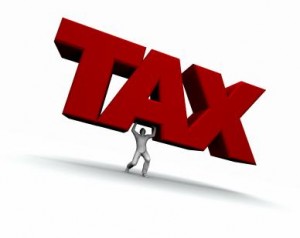President Obama has been running around lately claiming he’s cut small business taxes more than a dozen times. That no doubt would be news to the nation’s small business owners.
Obama’s been bragging about these tax cuts lately because his soak-the-rich income-tax hikes would hit plenty of small businesses, most of whom file taxes as individuals.
Obama has tried to downplay this, claiming just 3% of small businesses would face higher tax bills. (Even if that were true, it would mean 900,000-plus small firms would see their tax bills climb.)
No matter, says Obama, since he’s been an aggressive small-business tax-cutter.
“I’ve cut taxes for small business owners 18 times since I’ve been in office,” he said earlier this month.
Press Secretary Jim Carney said Obama “has passed small-business tax cuts and signed into law small-business tax cuts 17, or 18, or 19 times.”
But whatever number they’re touting, it’s bogus.
In fact, if you look at Obama’s list, you quickly realize that all but four have either expired or will soon expire, aren’t cuts at all, or are double-counted. And the rest are pretty much worthless.
For example, Obama still counts tax cuts that have already expired. The tax credit for hiring unemployed workers, enacted as part of the so-called HIRE act in 2010, is gone. So too is the break for estimated tax payments and the expanded deduction of health care expenses for the self-employed.
Meanwhile, several tax cuts are scheduled to expire this year, such as bonus depreciation, expanded expensing rules, a five-year carry-back rule for business credits, and capital gains exclusions.
And he counts the mere extension of a bonus depreciation rule as a tax cut, and counts the two subsequent extensions as two more cuts. He double counts other breaks as well.
The rest of the tax cuts Obama includes on his list are either of negligible benefit or are too complicated to be worth it.
One of these makes it easier to deduct cellphone costs and another limits penalties for errors in tax reporting. But these two changes will cut small-business taxes a grand total of just $567 million over the next decade.
And then there’s the small-business health insurance tax credit. The Obama administration promised that this credit, passed as part of ObamaCare, would help anywhere from 2 million to 4 million small companies get money back for providing health insurance benefits to employees.
But a Government Accountability Office report found that just over 170,000 companies actually claimed the credit. The reason: You had to wade through a thicket of rules to see if you were eligible for what turned out to be, in the GAO’s words, an “insubstantial” amount of money.
This is the problem with Obama’s entire approach to tax cuts, and why none of them has made a noticeable difference. They are either too narrowly targeted or too complicated, require businesses to jump through hoops to qualify, or are too temporary to have any long-term incentive effect.
“These are rifle-shot provisions that don’t have the same benefit as permanently lowering individual income tax rates because most of them are temporary,” said Chris Whitcomb, tax counsel at the National Federation of Independent Business.
They are, in short, designed more to give Obama something to brag about than actually to help small-business owners.
All of which might help explain why Obama’s policies have left small companies increasingly pessimistic.
The NFIB’s small business optimism index dropped sharply in June, and just 3% say they plan to add employees over the next three months.
Obama may think he can fool the public into believing his tax policies are helping small companies survive and thrive. Small-business owners know better.
— — — — — — — — — —
This article was originally published at www.investors.com on July 13, 2012.
